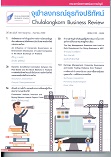Earnings Management, Corporate Governance and Insider Trading: Evidence from Thailand
Main Article Content
Abstract
บทคัดย่อ
หลักฐานเชิงประจักษ์ของประเทศที่พัฒนาแล้วได้แสดงให้เห็นว่าการมีธรรมาภิบาลส่งผลให้การจัดการกำไรลดลง อย่างไรก็ตาม เนื่องจากความไม่มีประสิทธิภาพของการรับรู้ข้อมูลข่าวสารในตลาดเกิดใหม่ การจัดการกำไรของบริษัทสามารถถูกใช้เพื่อเป็นกลไกหนึ่งในการทำให้คุณภาพของข้อมูลข่าวสารดีขึ้นได้ งานวิจัยนี้จึงทำการศึกษาว่าธรรมาภิบาลส่งผลต่อการจัดการกำไรของบริษัทหรือไม่ในตลาดเกิดใหม่โดยใช้ข้อมูลประเทศไทยปี 2545 – 2554 ที่ได้มีการปฏิรูปกฎเกณฑ์ด้านธรรมาภิบาลเป็นกรณีศึกษา ผลจากสมการถดถอยกำลังสองน้อยที่สุดสองขั้นแสดงให้เห็นว่าคุณลักษณะด้านธรรมาภิบาล อันได้แก่ คณะกรรมการที่มีความชำนาญด้านบัญชีหรือการเงิน การแยกบทบาทของประธานกรรมการและกรรมการผู้จัดการ และบริษัทครอบครัว มีความสัมพันธ์กับการลดลงของการจัดการกำไร ในขณะที่จำนวนคณะกรรมการที่มากขึ้นและสัดส่วนของกรรมการที่ไม่เป็นผู้บริหารที่สูงขึ้นมีผลทำให้มีการจัดการกำไรเพิ่มขึ้น นอกจากนี้ เราพบว่ากลุ่มหลักทรัพย์ที่จัดตามการซื้อขายหลักทรัพย์ของบุคคลวงในและการจัดการกำไรสามารถให้อัตราผลตอบแทนที่เป็นบวก อย่างไรก็ตาม เมื่อปรับปรุงอัตราผลตอบแทนดังกล่าวด้วยความเสี่ยงแล้วกลับไม่ปรากฎผลตอบแทนที่ผิดปกติอันแสดงถึงความประสิทธิภาพในการกำหนดราคา ผลการศึกษานี้จึงก่อให้เกิดประโยชน์ต่อคำโต้แย้งในด้านประสิทธิภาพของธรรมาภิบาลในตลาดเกิดใหม่ การนำไปใช้เชิงนโยบายที่เป็นไปได้ต่อผู้กำหนดกฎเกณฑ์ตลาดคือธรรมาภิบาลสามารถเพิ่มคุณภาพทางข้อมูลข่าวสารของกำไร
คำสำคัญ: ธรรมาภิบาล การจัดการกำไร ตลาดเกิดใหม่ การซื้อขายหุ้นโดยบุคคลวงใน ความอสมมารตรทางข้อมูล
Abstract
Empirical evidence for developed countries has shown that corporate governance has the capacity to constrain earnings management. However, because of endemic informational inefficiency in emerging markets, earnings management may actually be one of the mechanisms used to improve the quality of information. Using Thai regulatory reforms of corporate governance over the period of 2002-2011, this paper investigates whether corporate governance leads to greater earnings management in emerging markets. The findings from two-stage least squares show that corporate governance characteristics such as a board with directors having accounting or financial expertise, splitting the role of Chairman/CEO and family owners are associated with lower levels of earnings management, whereas larger boards and a higher proportion of non-executive directors are positively associated with earnings management. In addition, we find that a hedge portfolio based on insider trading conditioned on earnings management provides positive returns. However, once returns are adjusted for risk, there is no evidence of abnormal performance suggesting that efficient price formation in Thailand. The findings contribute to the debate on the efficacy of corporate governance in emerging markets. The policy implications of our study are that corporate governance can enhance the informational quality of earnings.
Keywords: Corporate Governance; Earnings Management; Emerging Markets; Insider Trading; Information asymmetry; Thailand.
Article Details
Opinions and discussions in papers published by the Creative Business and Sustainability Journal (CBSJ) are deemed as personal opinions and the responsibility of the writers. They are not the opinions or responsibility of the Chulalongkorn Business School of Chulalongkorn University.
Papers, content, information etc. appearing in the Journal are deemed to be the copyright property of the Chulalongkorn Business School of Chulalongkorn University. Anybody or any organization that wishes to publish any part of them or use them in any way must obtain written permission from the Chulalongkorn Business School, Chulalongkorn University.


